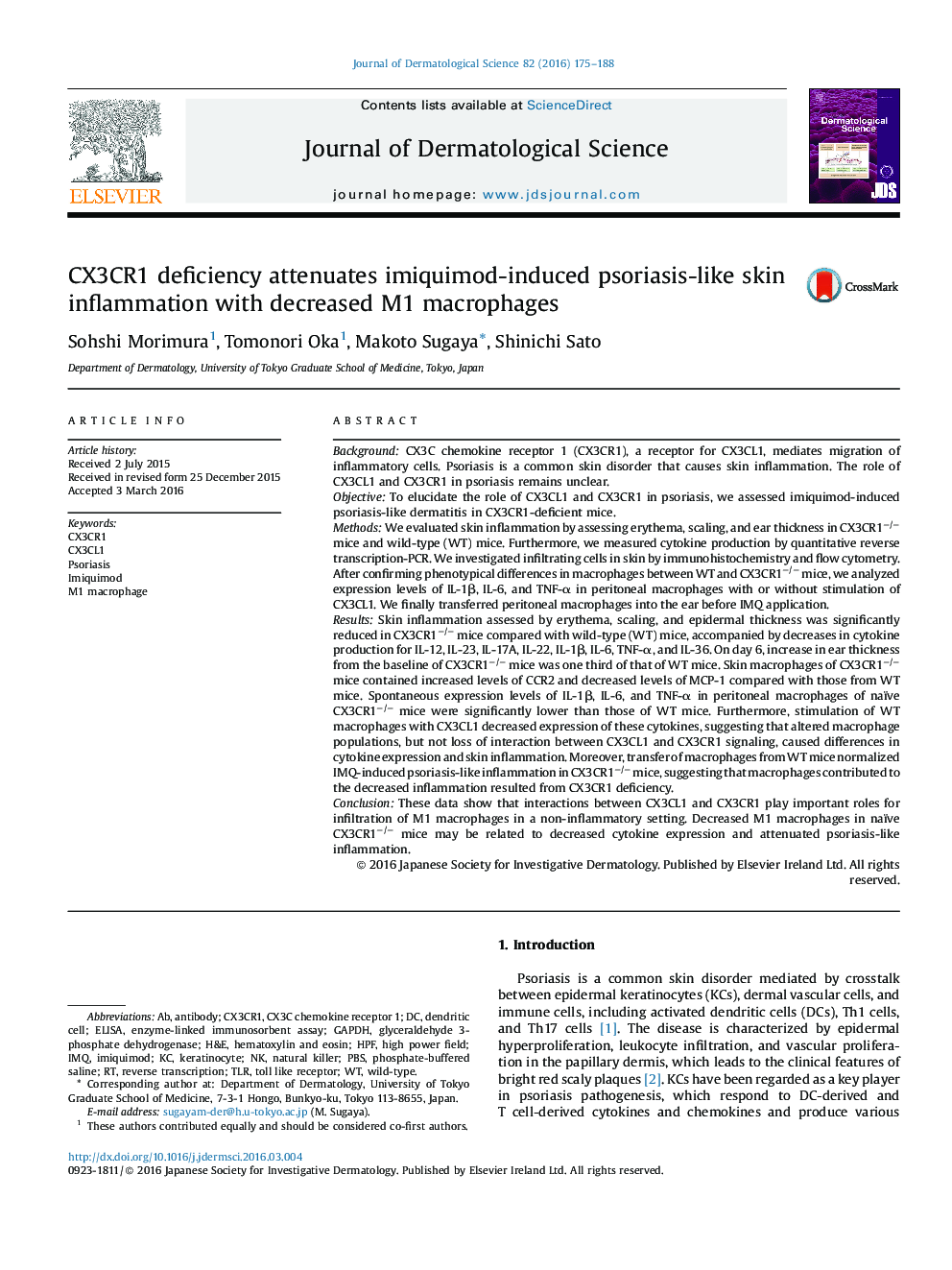| کد مقاله | کد نشریه | سال انتشار | مقاله انگلیسی | نسخه تمام متن |
|---|---|---|---|---|
| 3212489 | 1203177 | 2016 | 14 صفحه PDF | دانلود رایگان |

• CX3CR1 deficiency attenuated imiquimod-induced psoriasis like skin inflammation.
• CX3CL1/CX3CR1 interaction is important for infiltration of M1 macrophages.
• Decrease in M1 macrophages in the skin may attenuate psoriasis-like inflammation.
BackgroundCX3C chemokine receptor 1 (CX3CR1), a receptor for CX3CL1, mediates migration of inflammatory cells. Psoriasis is a common skin disorder that causes skin inflammation. The role of CX3CL1 and CX3CR1 in psoriasis remains unclear.ObjectiveTo elucidate the role of CX3CL1 and CX3CR1 in psoriasis, we assessed imiquimod-induced psoriasis-like dermatitis in CX3CR1-deficient mice.MethodsWe evaluated skin inflammation by assessing erythema, scaling, and ear thickness in CX3CR1−/− mice and wild-type (WT) mice. Furthermore, we measured cytokine production by quantitative reverse transcription-PCR. We investigated infiltrating cells in skin by immunohistochemistry and flow cytometry. After confirming phenotypical differences in macrophages between WT and CX3CR1−/− mice, we analyzed expression levels of IL-1β, IL-6, and TNF-α in peritoneal macrophages with or without stimulation of CX3CL1. We finally transferred peritoneal macrophages into the ear before IMQ application.ResultsSkin inflammation assessed by erythema, scaling, and epidermal thickness was significantly reduced in CX3CR1−/− mice compared with wild-type (WT) mice, accompanied by decreases in cytokine production for IL-12, IL-23, IL-17A, IL-22, IL-1β, IL-6, TNF-α, and IL-36. On day 6, increase in ear thickness from the baseline of CX3CR1−/− mice was one third of that of WT mice. Skin macrophages of CX3CR1−/− mice contained increased levels of CCR2 and decreased levels of MCP-1 compared with those from WT mice. Spontaneous expression levels of IL-1β, IL-6, and TNF-α in peritoneal macrophages of naïve CX3CR1−/− mice were significantly lower than those of WT mice. Furthermore, stimulation of WT macrophages with CX3CL1 decreased expression of these cytokines, suggesting that altered macrophage populations, but not loss of interaction between CX3CL1 and CX3CR1 signaling, caused differences in cytokine expression and skin inflammation. Moreover, transfer of macrophages from WT mice normalized IMQ-induced psoriasis-like inflammation in CX3CR1−/− mice, suggesting that macrophages contributed to the decreased inflammation resulted from CX3CR1 deficiency.ConclusionThese data show that interactions between CX3CL1 and CX3CR1 play important roles for infiltration of M1 macrophages in a non-inflammatory setting. Decreased M1 macrophages in naïve CX3CR1−/− mice may be related to decreased cytokine expression and attenuated psoriasis-like inflammation.
Journal: Journal of Dermatological Science - Volume 82, Issue 3, June 2016, Pages 175–188